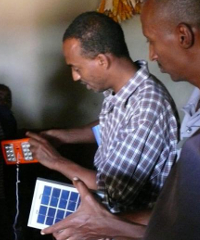Start-up snapshot: Providing affordable solar energy solutions to rural Ethiopia
Start-up: EnVent, Ethiopia
Yoseph Berhane (41) is the founder and general manager of Eternum Energy Ventures (or EnVent), an Ethiopian for-profit business that provides affordable solar energy products and phone charging solutions to the rural and low-income market.
Originally founded as Dungo Energy Solutions in October 2012, EnVent has partnered with German social enterprise, Villageboom GmbH, which supplies them with solar lamps.
Berhane believes, given the right opportunity and funding, there are solutions that can address environmental issues in Africa and told How we made it in Africa how EnVent plans to be one of those solutions.
1. Give us your elevator pitch.
Eternum Energy Ventures is developing a small-scale solar energy project to help rural households solve their lighting and phone charging problems with high quality solar lanterns.
We use an innovative business model to provide portable, durable, low-cost and high-quality solar lamps for lighting and charging with a full support system that includes cash discounts and payment in instalments upon product purchase.
My venture uses “solar agents” who earn income from selling lamp to individuals.
2. How did you finance your start-up?
My social enterprise uses internal funds and is operating without external finance. Local banks are still not willing to finance such projects unless you are a big company.
I am willing to work with investors who want to provide start-up capital so my company can qualify for government loans, bank credit or other forms of financing.
3. If you were given US$1m to invest in your company now, where would it go?
The $1m would be used for importing, marketing and to meet short-term working capital needs of my solar lantern distribution project in Ethiopia, and at the same time improve the lives of at least one million people.
4. What risks does your business face?
The six main risks include:
– Difficulty in accessing finance. The private sector does not have financial incentives to bring quality products into the market.
– Difficulty in accessing foreign currency. It takes roughly six months to access a currency.
– Excessive loan collateral requirements. For instance, the World Bank has allocated $20m to be loaned to private renewable energy companies. According to the loan structure, the Development Bank of Ethiopia can lend me 70% of the capital needed if I have both 30% capital at hand, and show a bank guarantee for the 70% loan.
– Low-quality products in the market. The market is dominated by low-cost, low-quality products. The high initial cost of good quality solar lighting devices favour the continued prevalence of low-quality products in the market.
– Limited purchasing power of a large portion of off-grid lighting users. The inability of most ‘unelectrified’ households to pay the upfront costs of good quality products favours the continued prevalence of low quality products in the market.
– A lengthy and uncertain importing procedure. For instance, determination of the value of products is performed by customs officials, not by consulting the value indicated on shipping documents. As a result, the value assigned to products is often arbitrary. East African countries like Kenya and Tanzania offer VAT exemption on all solar products, which can be a big saving for a small company like ours.
5. What has been the biggest mistake you have made, and what have you learnt from it?
Before starting my social enterprise I never realised how many different ways there were to view and respond to the same problem. This has become especially clear while developing solar projects that work off-the-grid. Previously I thought a solar panel is just a solar panel. But each project has its own flavour and style in the way it uses solar power and works with communities.
Small-scale projects in solar energy make a critical contribution to protecting and improving the environment at community and local level. I believe there are ideas out there that can successfully address all environmental issues, but they need the opportunity to thrive and show others that new ideas are worth something. That’s the key to how we can innovate and move forward with the environment.


